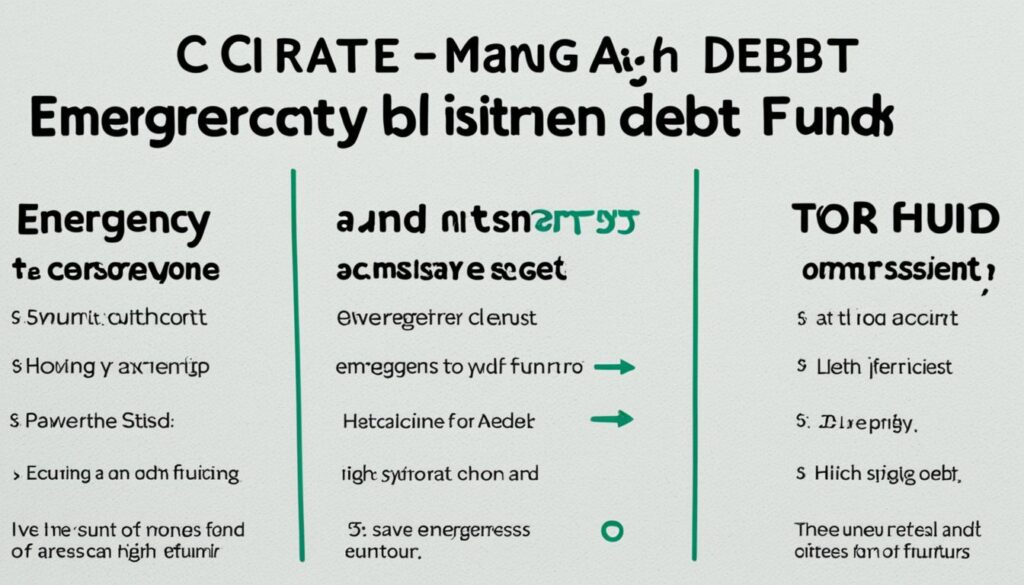Did you know that 43% of U.S. adults with a credit card balance incurred it due to unforeseen emergencies? This statistic underscores a significant dilemma many face: Should I build an emergency fund or pay off high-interest debt? The average expense for many families can be staggering, and while 89% of people believe they need enough savings to cover three months’ worth of expenses, only 44% of Americans can actually access $1,000 or more from their savings during a financial emergency12. With this financial landscape, the choices we make around savings and debts can have profound implications for our financial security.
Establishing a solid emergency savings fund is essential for mitigating risks associated with unexpected financial setbacks. On the other hand, high-interest debt can quickly spiral out of control, making it imperative for individuals to assess their financial priorities. This article aims to guide you through this intricate financial crossroads, exploring the importance of having reserve funds while also addressing the detrimental impacts of high-interest debts.
Key Takeaways
- The ideal emergency fund should cover three to six months’ worth of expenses.
- 43% of individuals incur credit card debt due to unexpected costs, highlighting the need for emergency savings.
- Building a robust savings strategy can alleviate the impact of financial emergencies.
- Only 44% of Americans can cover a sudden expense of $1,000 or more from their savings.
- Prioritizing between debt repayment and savings may vary based on individual financial situations.
The Importance of an Emergency Fund
Establishing an emergency fund is fundamental for individuals seeking a stable financial future. This safety net is crucial for managing unforeseen expenses, which can range from unexpected medical bills to urgent car repairs. With many Americans facing difficulty in maintaining adequate savings, the emergency fund importance cannot be overstated.
Why Create an Emergency Fund?
Creating an emergency savings fund provides peace of mind and financial stability. It allows individuals to avoid reliance on high-interest debt options, which can escalate quickly. A concerning statistic shows that 30% of adults cannot cover three months of expenses by any means, highlighting the widespread financial insecurity that many face today3. By being prepared for unexpected events, one can navigate life’s challenges with confidence.
Emergency Fund and Financial Security
Beyond just a buffer against unexpected costs, an emergency fund significantly contributes to overall financial security. Experts recommend having three to six months of living expenses saved, tailored to personal circumstances3. This preparation is vital as 61% of Americans are projected to deplete their emergency savings by the year’s end, underscoring an urgent need to prioritize saving4. Building an emergency fund empowers individuals, ensuring they have means to manage life’s uncertainties without succumbing to the pitfalls of debt.

Understanding High-Interest Debt
Understanding high-interest debt is crucial for effective personal finance decision-making. This type of debt can significantly hinder one’s ability to save and invest due to high repayment costs. Recognizing what qualifies as high-interest debt and its impact on finances is the first step towards developing a sound debt repayment strategy.
What Constitutes High-Interest Debt?
High-interest debt typically includes credit cards and personal loans that charge exorbitant interest rates. For example, the national average interest rate on credit cards was reported at 21.59% across various accounts as of February 20245. With such high rates, it is easy to see how balances can grow rapidly, leading individuals into a cycle of accumulating debt. The average credit card interest rate ranged from 16.43% to 22.63% depending on the terms of the card, creating a substantial financial burden for many individuals65.
Impact of High-Interest Debt on Your Finances
The consequences of high-interest debt can be dire, affecting overall financial health and stability. For instance, a credit card balance of $6,500 with an APR of 21.59% would take around 124 months to pay off at a minimum payment of $130, resulting in over $9,539 paid in interest5. In contrast, increasing the monthly payment by $250 reduces the payoff period to approximately 21 months, saving over $8,354 in interest. Such staggering figures illustrate the importance of strategic debt repayment to alleviate financial pressure and free up resources for future savings and investments.
Moreover, high-interest debt can lower credit scores, limiting access to more favorable financing options in the future. As individuals focus on high-interest debt payoff, the hope is to redirect available finances into building emergency savings and improving overall financial wellness.

| Debt Type | Average Interest Rate (APR) | Impact on Payoff Period | Total Interest Paid |
|---|---|---|---|
| Credit Card | 21.59% | 124 months (minimum payment) | $9,539 |
| Personal Loan | Typical range (6% – 36%) | Varies by loan amount | Varies significantly |
Understanding these financial dynamics is essential for effective personal finance decision-making and reinforces the need for a robust debt repayment strategy.
Should I Build an Emergency Fund or Pay Off High-Interest Debt?
Determining whether to focus on establishing an emergency fund or tackling high-interest debt can be a complex decision that varies based on individual circumstances. Financial experts generally advise having an emergency fund containing at least three to six months’ worth of essential living expenses7. This fund acts as a safety net, addressing unexpected costs and allowing individuals to avoid accruing further debt. Starting with a modest goal, saving just $84 per month can help achieve the initial target of $1,000 in a year8.
While the need for savings is evident, high-interest debt must also be managed effectively. Prioritizing high-cost debt without collateral, like credit card balances, is crucial due to the potential for significant interest charges7. It’s essential to evaluate your financial habits and create a solid money management strategy that accommodates both debt reduction and savings. Behavioral changes induced by events like the pandemic have highlighted the importance of savings, presenting opportunities for individuals to adjust their budgets and set aside discretionary income8.
Each person’s scenario is unique. For those with significant high-interest debts, focusing on debt reduction, particularly through methods like the debt snowball or debt avalanche strategies, can be an effective approach7. Conversely, having a small emergency fund can prevent financial distress during unforeseen situations and may promote a healthier overall financial position. Balancing these priorities is key in the emergency fund vs debt payoff discussion, ultimately guiding individuals to choose the best path for their financial well-being.
When to Prioritize an Emergency Fund
Financial planning priorities often involve a critical examination of your current situation, especially when assessing the necessity of an emergency savings fund. Without adequate savings, individuals can find themselves in a precarious position where unforeseen expenses, like medical bills or urgent home repairs, may force them to rely on credit cards. Given that the average annual percentage yield on a credit card exceeds 20%, this reliance can quickly lead to an escalating cycle of debt9.
No Emergency Savings: A Risky Situation
Operating without an emergency fund can be a risky situation where unplanned expenses push individuals to finance solutions via high-interest debt sources. Ideally, an emergency fund should cover three to six months of living expenses to mitigate the financial strain caused by unexpected events10. This level of preparedness not only safeguards against the need to resort to high-interest debt but also ensures financial stability in challenging situations.
Good Debt vs Bad Debt: The Role of Loans
Understanding the distinction between good debt vs bad debt is essential for effective financial management. Good debt, such as a mortgage or student loans, serves to build wealth over time, while bad debt, like credit card debt, can hinder financial progress due to soaring interest rates9. By prioritizing an emergency savings fund, individuals can avoid falling into debt traps triggered by reliance on credit, thus maintaining a healthier balance between saving and debt repayment10.
FAQ
Should I focus on building an emergency fund or paying off high-interest debt first?
How much should I save in my emergency fund?
What types of expenses should my emergency fund cover?
What qualifies as high-interest debt?
How can high-interest debt affect my finances in the long term?
What are the risks of not having an emergency fund?
How do I determine if I should save or pay off debt first?
What is the difference between good debt and bad debt?
Source Links
- https://www.lendingtree.com/debt-consolidation/emergency-fund-or-pay-off-debt/
- https://www.bankrate.com/banking/savings/these-guidelines-will-help-you-decide-whether-to-pay-down-debt-or-save/
- https://www.discover.com/personal-loans/resources/consolidate-debt/successfully-payoff-debt-build-emergency-fund/
- https://www.cnbc.com/select/pay-off-credit-card-debt-or-save-for-emergency-fund/
- https://www.investopedia.com/financial-edge/0212/saving-vs.-paying-off-debt.aspx
- https://www.cnbc.com/select/how-to-build-emergency-fund-while-in-debt/
- https://www.forbes.com/advisor/banking/saving-vs-paying-down-debt/
- https://www.truist.com/money-mindset/principles/stress-free-saving/save-money-or-reduce-debt
- https://www.cnet.com/personal-finance/banking/savings/should-i-save-money-or-pay-off-debt-first/
- https://www.nerdwallet.com/article/banking/emergency-fund-why-it-matters

